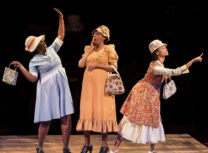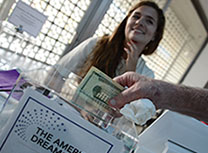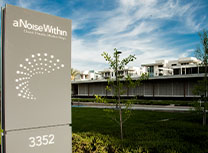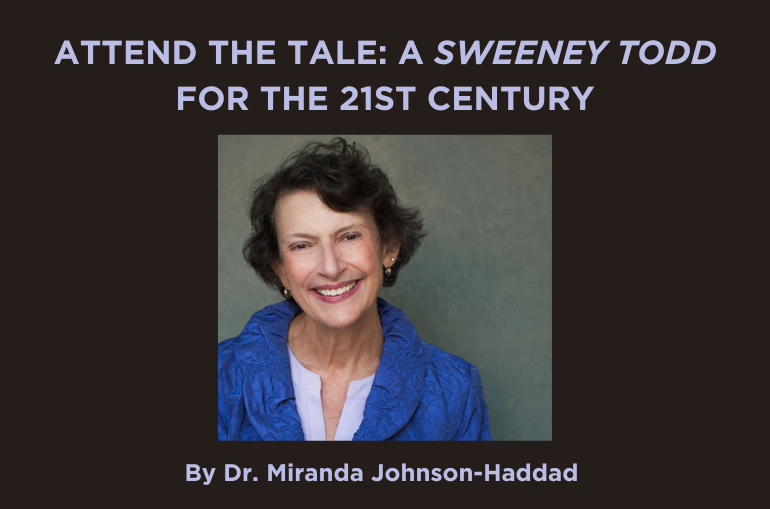Academic Decathlon 2018-19 Teams Up With Rosencrantz and Guildenstern!
By A Noise Within
September 10, 2018
“Academic Decathlon was one of my formative high school experiences. The positive ripple effect continues to spread twenty-plus years later. Academic Decathlon fostered a thirst for knowledge deep and wide, as well as an aptitude for critical thinking, study skills, and a work ethic that would continue to serve me after high school through college, law school, and beyond….The sheer intensity and time commitment of Academic Decathlon practices, as well as the small group size, really engendered a tight-knit family feel beyond anything I’d experienced.”
– Jody Vakili, Woodcreek High School Academic Decathlon Team (1995-1998)
The United States Academic Decathlon (USAD), founded by Dr. Robert Peterson in 1962, is an academic competition unlike any other. The USAD doesn’t care if you’re a math whiz or a poet laureate – Academic Decathlons are about stamina, perseverance, and proving that you have what it takes to become an expert in any subject. Above all else, the USAD values academic growth, achieving goals via teamwork, and providing equal opportunities to students from all academic levels.
Want to give it a try? All an academic decathlon team needs to compete is a faculty member to serve as the coach and nine students. These nine students must equally represent three academic “divisions” – Honor (GPAs of 3.75 or greater), Scholastic (GPAs of at least 3.0, but lower than 3.75), and Varsity (GPAs lower than 3.0). Confusing? To simplify it, your team needs 3 “A” students, 3 “B” students, and 3 “C” students.
Every year, the USAD selects a different theme that the seven different subjects covered – art, music, literature, science, social studies, math, and economics – will connect to. In a competition, a decathlon team must endure two speech events (one speech on a topic of the student’s choosing, the other one a topic the student hasn’t seen before), an essay from each student demonstrating what they’ve learned about the decathlon theme, interviews from the judges, and a multiple-choice exam in each subject. The competition culminates in a “Super Quiz,” an event where a team takes turns solving challenges before a live audience.
The 2018-2019 USAD theme is “The 1960s: A Transformational Decade.” Students must immerse themselves in every cultural and societal shift undergone during that era. A team will have to study everything from the beginnings of laser technology to the evolution of rock music to the Kennedy assassination. To give you an idea of just a fraction of what Academic Decathlon teams must become experts in, we’ll take a closer look at the literature curriculum for the 2018-2019 competition.
Every year, USAD teams are to read a few selected short works of literature and one full-length novel or play, as well as brush up their critical reading knowledge. When building a literary curriculum for the USAD, the prospective literature selections are proposed by the USAD literature curriculum writer and submitted for approval by the curriculum advisory group. For the 2018-2019 Academic Decathlon, the curriculum committee felt that the piece of literature to best sum up the 1960s was Tom Stoppard’s play Rosencrantz and Guildenstern Are Dead. The curriculum writer (who wishes to remain anonymous) explains that Rosencrantz and Guildenstern “is both a culmination of historical and cultural forces and an original expression of such forces and movements.”
Many of Tom Stoppard’s works – along with numerous plays from the 1960s onward – fall under the genre umbrella of “Theatre of the Absurd,” a theatrical movement born from the 1950s that paved the way for avant-garde, experimental theatre. Theatre of the Absurd builds the theatrical world patrons are used to only to tear it down – in the words of the USAD literature curriculum writer, “it is a world unlike the one in which we live, but one that is recognizable nonetheless.”
More than half a century later, the art bred from the 1960s looks like a progressive, politically-charged, psychedelic tie-dye dreamscape. The ideas were often loud, and the execution was often bold. Rosencrantz and Guildenstern feels like both a summary of these attitudes and an expulsion of them; an apolitical story based on the most famous tragedy ever written. Some of the shorter works of literature that decathlon teams must study include Martin Luther King Jr.’s “Letter from a Birmingham Jail,” an important document for the American Civil Rights Movement; the song “A Hard Rain’s a-Gonna Fall” by the oft-political songwriter Bob Dylan; and an excerpt from Tim O’Brien’s The Things They Carried, a collection of short stories about the Vietnam War.
After competing at state levels, the winning school from each state (and a few eligible international teams) will be invited to compete in the USAD National Championship. At Nationals, these 50+ teams divided into three divisions (based on size) and will be pitted against each other for a chance at the overall title. Since the first-ever National Championship in 1982, winners have come from one of three states – Wisconsin, Texas, and California. Since 2010, the overall champions have been one of two California schools – El Camino Real High School and Granada Hills Charter High School. Along with the chance for the championship title, students can compete for several other awards and distinction:
- During the final banquet of each National Championship, a Speech Showcase is held, honoring the students with the best-prepared speeches from the public speaking portion.
- 9 medals are awarded to the best overall teams (gold, silver, and bronze for each division).
- 27 medals are awarded to the top 3 scoring individuals in each subject.
- The Kristen Caperton Inspiration Award is given to a student who demonstrates strong dedication to their team and performs exceptionally despite difficult circumstances. Past recipients have included a blind decathlete who pioneered techniques to aid future students like them and a student with Stage 3 Hodgkin’s lymphoma who was undergoing chemotherapy while studying for the USAD.
In 2006, virtual competitions were launched so that schools with smaller populations could compete as well. Additionally, USAD hosts individual competitions so that students who are homeschooled, from alternative schools, or whose high school Academic Decathlon teams are eliminated can have the chance to prove themselves.
The USAD national competition will take place from April 25 to April 27, 2019. Rosencrantz and Guildenstern Are Dead runs at A Noise Within from October 7 to November 18, 2018.








